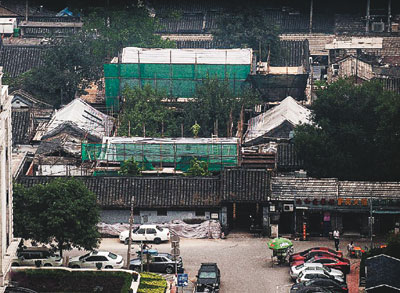|

AUTHORITIES have halted a project to give an ancient courtyard home in downtown Beijing a face-lift and issued a hefty fine to the construction firm and the courtyard’s owner, Beijing cultural heritage bureau said last week.
The century-old courtyard, No. 51 in Shijia Hutong, is better known as the former residence of Zhang Shizhao, one of the most prominent scholars and politicians in modern Chinese history. After his death in 1973, the courtyard home was lived in by his daughter Zhang Hanzhi who once served as Chairman Mao’s English teacher and her husband Qiao Guanhua, a former foreign minister.
The residence is a siheyuan, a rectangle courtyard surrounded by tilt-roofed brick houses on each side. The layout dates back thousands of years. Though once very common in Beijing, many courtyard homes have been demolished over the last few decades.
Beijing’s cultural heritage bureau said it was prompted to investigate the “illegal” construction after Zhang Shizhao’s granddaughter Hong Huang broke the news on her blog, saying the ancient courtyard home was being demolished.
In a statement, the bureau said it found the construction firm started the project without proper licenses and part of the project was not approved by cultural heritage authorities.
The project was halted and a fine of 200,000 yuan (US$ 31,496) was issued, the statement said.
The demolition of Beijing’s ancient courtyard homes has become a sensitive issue as people fear that invaluable cultural relics might eventually be wiped out by real estate developers vying for lucrative developments on the ancient courtyards or their prime locations — usually at the heart of old Beijing city.
In January, authorities halted a construction project on another former residence of a famous scholarly couple in Beijing amid public outcry over failure to protect cultural heritages.
(SD-Agencies)
|

